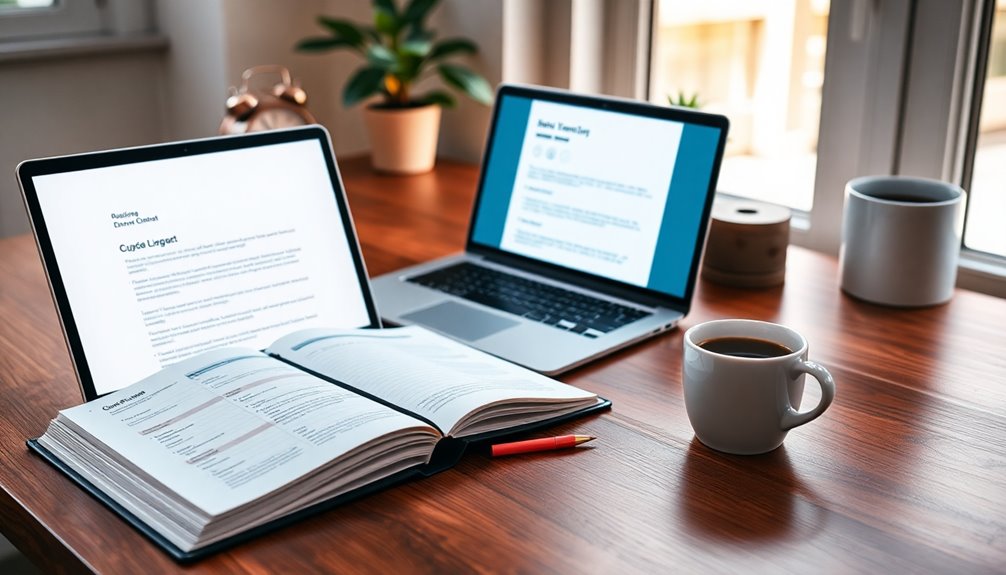To master multitasking in interviews, you'll want to prepare for key questions that assess your skills. Expect to explain what multitasking means to you and share specific examples of managing multiple projects. Discuss how you prioritize tasks and the tools you use to enhance your efficiency. Be ready to talk about multitasking under tight deadlines and any challenges you've faced along the way. Highlighting your adaptability and critical thinking abilities will showcase your multitasking prowess. There's much more to uncover about effective strategies and responses that can set you apart in the interview process.
Key Takeaways
- Understand the definition of multitasking and articulate it clearly during interviews to demonstrate your comprehension of the concept.
- Prepare specific examples of managing multiple projects simultaneously, highlighting your effectiveness and success in those situations.
- Discuss your prioritization methods, showcasing how you identify high-impact tasks and manage time effectively.
- Mention digital tools or apps you use to enhance your multitasking capabilities and keep tasks organized.
- Share experiences of multitasking under tight deadlines, emphasizing your adaptability and resilience in challenging situations.
Understanding Multitasking

Multitasking is an essential skill that many professionals rely on daily, especially in fast-paced environments. You juggle multiple tasks simultaneously, enhancing productivity and demonstrating your ability to manage time effectively.
In roles like executive assistants, you might take notes while listening in meetings, showcasing your capacity to handle diverse responsibilities. Employers value candidates who can multitask, as it often leads to better project completion rates and increased job satisfaction.
By mastering this skill, you not only improve your own efficiency but also contribute positively to your team's dynamics. Understanding multitasking means recognizing its significance in today's work culture, where adaptability and quick thinking are crucial for success. Moreover, self-awareness can greatly enhance your multitasking abilities by helping you prioritize tasks effectively.
Embrace this skill, and watch your professional opportunities expand.
Advantages of Multitasking

While juggling multiple tasks can seem intimidating, the advantages of multitasking are significant in enhancing your efficiency and productivity. By managing various responsibilities at once, you save time and often complete projects quicker.
This skill helps you develop effective time management and adaptability, making you a valuable asset in any dynamic work environment. As you handle multiple tasks, you'll sharpen your critical thinking and prioritization abilities, improving your overall performance.
Additionally, multitasking encourages strong organizational skills and attention to detail, essential for meeting deadlines. Ultimately, mastering multitasking can lead to increased job satisfaction and better project completion rates, making you a standout candidate in today's competitive job market.
Moreover, embracing challenges can further enhance your multitasking capabilities by fostering resilience in the face of competing priorities.
Embrace these benefits to elevate your professional journey.
Key Interview Questions

When preparing for interviews, understanding the key questions about multitasking can set you apart from other candidates. Expect to answer questions like, "What is multitasking in your own words?" This allows you to showcase your understanding of the concept.
Be ready to describe a specific instance when you managed multiple projects, demonstrating your real-world experience. Another significant question might be, "How do you prioritize tasks when multitasking?" This gives you a chance to reveal your organizational skills.
Additionally, consider discussing the tools you use to enhance your multitasking abilities. Finally, prepare an example of multitasking under tight deadlines, as it highlights your ability to handle pressure.
These questions help employers gauge your multitasking skills and adaptability.
Effective Multitasking Strategies

Effective multitasking strategies can greatly enhance your productivity and efficiency in the workplace. Start by prioritizing your tasks; focus on high-impact activities first.
Break larger projects into smaller, manageable parts to avoid feeling overwhelmed. Use digital tools like project management apps to keep track of your progress and deadlines.
Schedule specific time slots for each task, allowing for dedicated focus without interruptions. Don't forget to regularly review and adjust your priorities as needed; flexibility is key.
Additionally, practice active listening and note-taking during meetings to manage information effectively. Incorporating time management apps can further streamline your task organization and reduce procrastination.
Common Multitasking Challenges

What challenges do you face when juggling multiple tasks? You might find that multitasking can lead to increased errors and stress, making it hard to maintain focus on each task.
As you switch gears frequently, you risk miscommunication with colleagues, which can hinder collaboration. Here are some common challenges you might encounter:
- High Error Rates: Constantly shifting your attention can cause mistakes, which may delay projects or affect quality.
- Burnout Risk: The pressure of managing several tasks at once can lead to physical and mental exhaustion.
- Decreased Efficiency: Instead of speeding up your workflow, multitasking might slow you down as you struggle to keep track of everything.
Recognizing these challenges can help you develop strategies to mitigate their impact.
Skills for Listening and Writing

Listening and writing simultaneously is an essential skill that can greatly enhance your productivity in fast-paced environments. To master this skill, you need to practice active listening, which involves fully concentrating on the speaker while jotting down key points.
Using shorthand or bullet points can help you capture information efficiently without losing focus. It's also vital to minimize distractions, allowing you to absorb what's being said while documenting it effectively.
Additionally, you should develop a system for organizing your notes, making it easier to reference them later. Regularly practicing this skill in meetings or discussions will improve your ability to multitask, ensuring that you remain engaged and informed while producing accurate written records. Implementing strategies for self-care practices can further enhance your concentration and productivity.
Crafting Strong Responses

During your interview, crafting strong responses is key to showcasing your multitasking abilities.
You want to clearly illustrate how you handle multiple tasks without compromising quality. Here are three tips to help you formulate effective answers:
- Use the STAR Method: Structure your responses by outlining the Situation, Task, Action, and Result. This keeps your answers focused and relevant.
- Be Specific: Provide concrete examples from your experience. Highlight specific tools or methods you used to manage tasks efficiently.
- Show Adaptability: Emphasize how you adjust your strategies when faced with unexpected challenges. This illustrates your flexibility and problem-solving skills. Additionally, demonstrating your ability to establish healthy boundaries can show how you prioritize tasks effectively in a busy environment.
Frequently Asked Questions
How Can Multitasking Impact Team Collaboration and Communication?
Multitasking can greatly enhance team collaboration and communication. When you juggle multiple tasks, you become adept at sharing information quickly and effectively, which keeps everyone in the loop.
However, it can also lead to misunderstandings if you're not careful. By prioritizing tasks and utilizing tools for organization, you can streamline communication and make certain that team members stay aligned.
Balancing multitasking with focused attention is key to maintaining a productive team dynamic.
What Roles Typically Require Strong Multitasking Skills?
Roles that typically require strong multitasking skills include executive assistants, project managers, and customer service representatives.
In these positions, you'll often juggle multiple tasks simultaneously, such as managing schedules, responding to inquiries, or overseeing project timelines.
You'll need to prioritize effectively and adapt to changing demands, ensuring that each responsibility is addressed promptly.
Strong multitasking abilities not only enhance your productivity but also contribute greatly to your team's overall efficiency and success.
Are There Industries Where Multitasking Is Discouraged?
Yes, there are industries where multitasking's discouraged. For instance, in healthcare, focusing on one patient at a time guarantees quality care and reduces errors.
Similarly, in creative fields like writing or design, deep concentration fosters better results.
These industries prioritize accuracy and creativity over speed, so it's crucial to be aware of when to put multitasking aside and fully engage with the task at hand, guaranteeing peak performance and outcomes.
How Do Cultural Differences Affect Multitasking Approaches?
Cultural differences can greatly shape your approach to multitasking. For instance, in some cultures, focusing on one task at a time is valued, fostering depth and quality over quantity.
Conversely, others emphasize efficiency, encouraging simultaneous task handling. This variance affects not just workplace productivity but also communication styles and relationship-building.
Understanding these nuances can help you adapt your multitasking strategies, ensuring you connect effectively with diverse teams and enhance collaboration in global environments.
What Is the Relationship Between Multitasking and Mental Health?
Multitasking can greatly impact your mental health. Constantly juggling multiple tasks might lead to increased stress and anxiety levels, making it hard to focus.
You might find that switching between tasks drains your energy and reduces overall productivity. Additionally, the pressure to perform well under multitasking conditions can contribute to burnout.
To maintain your mental well-being, it's crucial to prioritize tasks and take breaks, allowing you to recharge and manage stress effectively.
Conclusion
Mastering multitasking is like juggling flaming torches; it takes skill, focus, and practice to keep everything in the air without getting burned. By understanding your strengths and preparing for key interview questions, you can showcase your ability to thrive in fast-paced environments. Remember, employers want to see how you balance multiple tasks seamlessly—so when you step into that interview, let your experiences shine like a well-executed performance, enchanting them with your multitasking finesse.
Eugene brings a fresh, dynamic voice to our platform as one of our talented Writers. Specializing in research-driven content, he explores the latest findings in psychology and personal growth, translating them into actionable insights for our readers. Eugene’s work is fueled by a curiosity about what makes us tick and a desire to help others unlock their potential.










